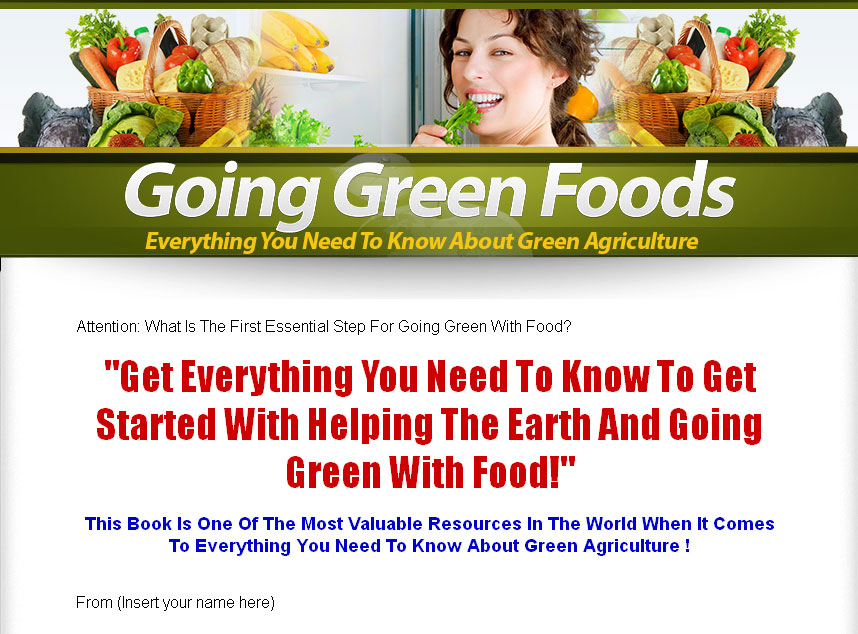Salespage Snapshot:

>>> Click Here To View Full Sales Page…
Table Of Contents
Foreword
Chapter 1: Introduction
Chapter 2: What Does Going Green With Food Mean
Chapter 3: What Is Sustainable Agriculture
Chapter 4: What Is Organic Agriculture
Chapter 5: The Difference Between “Natural” Foods And “Organic” Foods
Chapter 6: The Benefits Of Growing Your Own Food
Chapter 7: Planning An Environmentally Friendly Garden
Chapter 8: Finding “Green” Farmers In Your Area
Chapter 9: Final Tips
Wrapping Up
Sample Content Preview
Foreword
Organic agricultural techniques blend scientific knowledge of environmental science and modern technology with traditional agricultural practices based on naturally happening biological processes. Organic agricultural techniques are examined in the field of agro ecology. Although conventional agriculture utilizes synthetic pesticides and water-soluble synthetically purified fertilizers, organic farmers are limited by regulations to utilizing natural pesticides and plant food.
Going Green Foods Everything You Need To Know About Green Agriculture
Chapter 1: Introduction
Synopsis
The chief techniques of organic agricultural include crop rotation, green manures and compost, biologic pest control, and mechanical cultivation. These measures utilize the natural surroundings to enhance agricultural productivity: legumes are set to fix nitrogen into the soil, natural insect predators are promoted, crops are rotated to confound pests and regenerate soil, and innate materials like potassium bicarbonate and mulches are utilized to check disease and weeds. Sturdier plants are generated through plant breeding instead of genetic engineering. The Basics
Although organic is basically different from conventional because of the utilization of carbon based fertilizers compared with extremely soluble synthetic based fertilizers and biologic pest control rather than synthetic pesticides, organic agricultural and large-scale established agricultural are not totally mutually exclusive. A lot of the techniques formulated for organic agriculture have been adopted by more established agriculture. For instance, Integrated Pest Management is a many-sided technique that utilizes assorted organic techniques of pest control whenever conceivable; however in conventional agricultural might include synthetic pesticides only as a last resort.
Crop diverseness is a distinctive feature of organic agricultural. Conventional agricultural centers on mass production of one crop in one place, a practice named monoculture. The science of agro ecology has disclosed the advantages of polyculture (multiple crops in the same place), which is frequently employed in organic agricultural. Planting a assortment of veggie crops backs up a broader range of advantageous insects, soil microorganisms, and additional factors that add up to total farm health.
Other Details- 1 Ebook (PDF), 36 Pages
- 1 Salespage (HTML)
- 5 Ecovers (JPG)
- Year Released/Circulated: 2013
- File Size: 6,690 KB
License Details:
[Yes] Includes Reseller Website
[Yes] Can sell Master Resale Rights
[Yes] Can be added to paid membership sites
[Yes] Can be offered as a bonus to one other product
[Yes] Can be packaged
[NO] Can be offered through auction sites
[NO] Can be given away
[NO] Can be added to free membership sites














